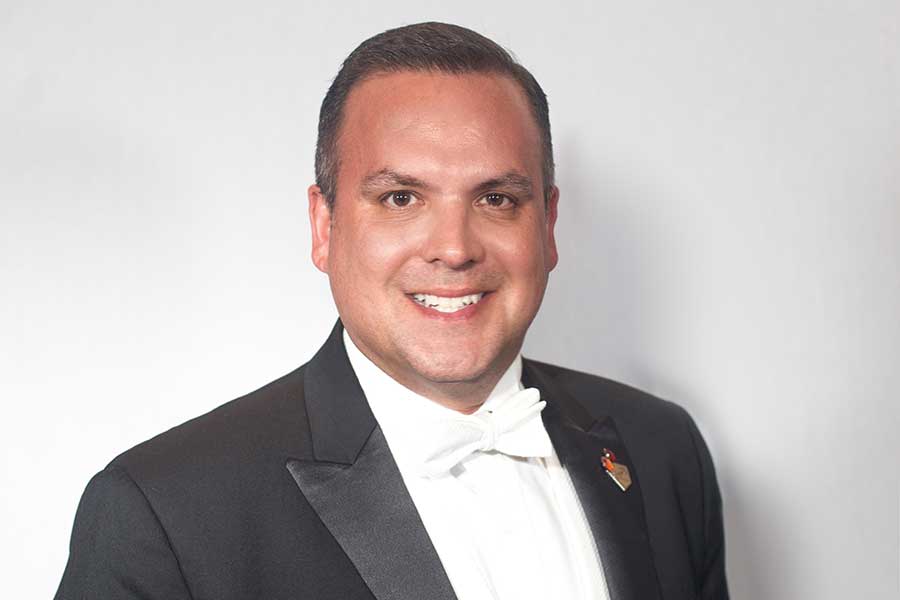The Philadelphia Gay Men’s Chorus is partnering with the Columbus Gay Men’s Chorus of Ohio to perform “Two Boys Kissing,” based on out gay writer David Levithan’s eponymous novel, in the afternoon and evening of March 24 at the Lutheran Church of the Holy Communion. Levithan, a New York Times bestselling author, is expected to attend the evening performance.
The concert is a two-act production. In the first, both choruses perform songs that reflect the stages of coming out — one of the themes in Levithan’s book. The songs include Diana Ross’ “I’m Coming Out” and gay anthems like Cyndi Lauper’s “True Colors,” Erasure’s “A Little Respect” and George Michael’s “Freedom,” alongside show tunes from “Dear Evan Hansen,” “Sideshow” and “Kinky Boots,” as well as the film “Camp.”
The second act is the performance of “Two Boys Kissing,” which came out in 2013 and is based on a true story. Joshua Shank composed the music, with Levithan and Eric Grant cowriting the libretto. The story opens with two 17-year-old boys, Harry and Craig, planning to kiss for 32 hours to set a world record.
Other storylines include the pink-haired Avery and the blue-haired Ryan going on their first date, and another youth, Cooper, struggling with a disapproving father. The production features six narrators and 140 chorus members — 90 from Philadelphia and 50 from Columbus — who act as a Greek chorus and represent a generation lost to AIDS. An eight-piece orchestra backs the chorus.
Joseph Buches, artistic director of PGMC, chatted with PGN about the performance’s impact on younger audiences.
PGN: Why do you think the gay-teen novel “Two Boys Kissing” is well-suited to a choral performance?
JB: It addresses the stories of coming out and the hardship some kids go through. It gives students guidance and lets them know about other coming-out stories, trans issues, online situations — where students have an online profile and the ramifications of that — and coming out and being proud of who they are. The story is about two boys who are making a statement about coming out and breaking the record for the world’s longest kiss. In the book, there are five or six stories, but in this version, there are only three stories.
PGN: The characters in the show are closeted and outed, bullied and confident. What character do you identify with?
JB: The out-and-proud one. I never had a hard coming-out story. I am who I am. I guess I identify with the two boys kissing and being who they are in the public world.
PGN: How would you describe a memorable kiss you had?
JB: When I met my husband. We’ve been together 11 years and have been married for four.
PGN: The kiss is designed to make folks less fearful of two boys kissing; it is a response to a hate crime. Can you talk about how the chorus empowers its members and the community?
JB: When I meet with other directors for GALA [Gay and Lesbian Association] choruses, we talk about things, and we all feel choruses are still relevant — now more than ever. We do a school-outreach performance every month. The [students] are so happy we are there. The younger generation can come out more easily, but how do they associate what they are feeling and experiencing? The students know they are different, but they are not at a point where they are ready to come out. But seeing us perform, it gives them courage. We got a letter one year about a female student who came out to her family. It is rewarding to hear you helped someone — especially as some chorus members had a tough time themselves at that age. The singers, too, see the impact they have being there and talking to students and performing. If a gay chorus came to my school when I was in high school, I think things would be different.
PGN: The Greek chorus in the production actually sings, “Just because it’s better now doesn’t mean it’s always good.” How do you think this story resonates with audiences?
JB: There are a lot of young people who are having a much easier time, but we still need to be there for each other, and find the best way to guide young people. This novel has helped to do that. When we are performing it, we have narrators taking on these roles, and having a person portraying these characters can bring the book and the message to life.
PGN: There are songs that are inspirational, such as “Songs for Some of Us.” Other songs are more poignant and powerful, like “Song for the Kid Out There.” Which song resonates with you?
JB: “Make More Than Dust” — the final song — is really powerful. “Do what you can do.” Those words wrap the whole story together.
The performances of “Two Boys Kissing” will be held 2 and 8 p.m. March 24 at the Lutheran Church of the Holy Communion, 2110 Chestnut St. Visit http://bit.ly/twoboyskissing to purchase tickets, which start at $20. Students can attend for free with valid ID and by making a reservation at [email protected]. There is also a post-concert pizza party where teens can meet with the choral singers.

